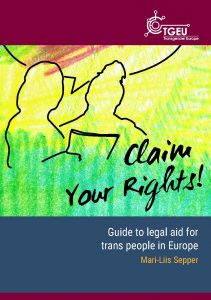
Claim Your Rights
Guide to legal aid for trans people in Europe
TGEU’s guide to legal aid for trans people in Europe provides information on how to claim your right to legal aid as provided for in Article 6 of the European Convention on Human Rights (“ECHR”), Article 47 of the Charter of Fundamental Rights of the European Union (“the Charter”), in a number of European Union (“EU”) directives, such as Directive 2016/1919, and in various other European law documents.
This guide covers:
- legal aid in criminal cases,
- legal aid in civil cases,
- legal aid in administrative cases, and
- sample country information.
What is legal aid?
Legal aid is defined as a state support enabling people to exercise the right of access to a lawyer. It allows people who have little income to meet the costs of hiring a lawyer or of a court case. It facilitates access to basic rights, either to defend oneself in court against the accusation of a crime (criminal proceeding) or to bring a claim against another person (civil proceeding). It may also help to challenge a decision of a public authority (administrative proceeding). Legal aid can take various forms, including support for the costs of a lawyer, providing access to legal documentation, or free legal counselling.
Order copies of the guides
To order copies of the guides, please fill in the order form. We especially appreciate orders from groups or organisations that are willing to distribute the guides in their national or regional context.
More information on EU law
For more information and resources on EU law and trans people’s rights in the EU, check our EU law resources page.
This publication has been produced with financial support from the Rights, Equality and Citizenship Programme of the European Union, the Open Society Foundation, and the Government of the Kingdom
of the Netherlands. The contents of this publication are the sole responsibility of Transgender Europe, and can in no way be taken to reflect the views of the European Commission, the Open Society Foundations or the Dutch Government.